- Home
- Gary Corby
Death on Delos Page 9
Death on Delos Read online
Page 9
In fact, I did. Diotima had to shake me.
“Nico, wake up!”
“What? What did you say?” I said groggily. “I wasn’t asleep.”
She laughed. “You’ve been asleep half the morning. Look out the window.”
I did. Apollo was halfway up in the sky.
“You let me sleep!” I accused her.
“I certainly did. You’re no good to me when you’re so tired that you can’t even walk in a straight line.”
I had to admit that was true. I also had to admit the sleep I had gotten wasn’t enough. My eyes felt like someone had thrown grit into them, and the rest of me felt like the dead in Hades.
Yet some sleep was better than none, and in my army days they’d made us march through the night and then exercise all day. That was only seven years ago. If I could do it back then, I could do it now.
“What have you been doing while I slumbered?” I asked.
“Acquiring the list of Geros’s associates,” Diotima said. “Also, getting some new papyrus.” She handed me a fresh sheet. On it was written a list of names, none of which I recognized.
“Where did you get this?” I asked, waving the list.
“The Oikos up at the temple has office supplies. I stole some papyrus.”
“I meant the names.”
“Oh, I asked Meren, the young priestess,” Diotima said breezily. “She wrote down for me the names of everyone who was in Geros’s group last night. You know, the ones who surrounded him like acolytes.”
“Anaxinos had a group around him too,” I said.
“Yes, I noticed, I was one of them,” said my wife. “Pericles had a group with him, too.”
“Yes, I noticed, I was one of them,” I said. “But they all left before Geros.”
“So did Anaxinos and his people. There weren’t many left behind in the sanctuary to kill Geros, and based on the mess I saw up there this morning, most of them were drunk.”
“Then let’s think about who is likely to have been Geros’s nemesis,” I said. “Who stands to gain from his death?”
“The Delians would say Pericles,” Diotima said at once. “I’ve heard the talk in the village. Everyone is convinced Pericles ordered Geros removed.” She paused, then said, “Nico, they all expect me to prove that Pericles did it.”
I put an arm round Diotima to comfort her, because I knew what that pressure felt like.
“Welcome to investigation,” I told her. “Everyone but the detective thinks they know the answer, and they expect you to deliver the goods for them.”
Diotima leaned into me. “I suppose I’ll get used to it,” she said, and sighed.
I wished her luck with that, because I never had. What I’d learned was that the only way to get rid of the pressure was to find the killer, with enough proof to convince everyone. The only real way to help Diotima was to find that murderer.
I said, “The Delians think it was Pericles, but we know what the Delians don’t. We know that Pericles had already removed Geros, with a lot of coins, and coins never killed anyone. Pericles actually had the least to gain from Geros’s death. This murder causes him immense trouble.”
“Yes, I see that,” Diotima said. “It’s the same argument that exonerates you.”
“Right.” I nodded confidently. “So it had to be a Delian who killed Geros,” I concluded. I was immensely pleased with my impeccable logic.
Diotima thought about it. “But as you say, the Delians don’t know that Geros had been bought.”
“Right.”
“So the Delians had no reason to kill Geros either,” Diotima said.
“Right . . .” I began. Then I realized the implications. “Oh. I didn’t think of that.”
It was Diotima’s turn to nod wisely. “The Delians had no reason to kill Geros, because they believed he was protecting the treasure. Pericles had no reason to kill Geros, because he knew Geros had been bought.”
“Therefore nobody had a motive to kill Geros,” I said. “That’s . . . unfortunate.”
“Very.”
We sat on the bed, side by side, contemplating the fact that we had talked ourselves into a dead end.
“I suppose there’s one piece of good news,” Diotima said, not sounding particularly happy about it.
“What’s that?” I asked.
“If we can find anyone with a motive to kill Geros, we’ll probably have our man.”
“Maybe,” I said, and didn’t believe it for a moment. Life is never that neat.
I contemplated life’s sloppiness. That inspired another idea. “Diotima, on the facts as we have them, Geros isn’t dead, because no one had a reason to kill him.”
“There’s a certain paradox in that statement—” she began.
“Therefore the facts as we have them aren’t right,” I interrupted her. “What we need are newer, better, fresher facts.”
“You sound like an agora salesman,” she said. “What do you suggest?”
“Let’s start with something small. Something we can understand.”
“Such as?”
I reached into her pouch, and brought out one of the pieces of hard evidence that we had. I opened my palm to show her. “It’s only a little thing—it might not lead anywhere—but let’s check out these coins.”
The High Priest
We went in search of Anaxinos. We found him at his home. Diotima and I were admitted at once.
Anaxinos sat in his courtyard, upon a dining couch. I thought it odd that a man of his standing should be doing nothing at the busiest time of day until I noticed that, like so many, his hair was shorn. Anaxinos was in official mourning.
“High Priest of the Delian Apollo, may we intrude upon you?” Diotima asked in that formal, sing-song voice that seems to be the specialty of priests and priestesses everywhere. I made a mental note to ask Diotima some time if they were all taught to speak like that.
“I have been expecting you, Priestess,” Anaxinos replied with equal gravity. “A pregnant lady must not stand in my home, nor must any guest. Please be seated and relax, both of you.”
We sat, but we didn’t relax. I didn’t dare lie back for fear that I might fall asleep again. Diotima lay back, and I could tell from her expression that she was relieved to have the weight off her feet. I would have to be careful to make sure she didn’t over-exert herself on this job.
The chief priest and archon of Delos rated the best home on the island, though it was barely larger than what you’d expect for a successful merchant in Athens. Nor were the furnishings particularly plush. The dining couches were functional rather than ornate. They showed signs of having been stripped back and re-oiled. By Athenian standards this was a middle-class dwelling, barely better than the one in which my own family lived. The tables and furnishings likewise showed every sign of having been there for longer than I would have expected.
Anaxinos’s grief did not extend to spurning high quality wine. I noticed a kylix beside him—a wide, shallow, stemmed cup used at parties—and within it a wine that, from the aroma, could only be from Lampsacus. I flattered myself that I knew something about wine. Lampsacus was one of the best wine growing districts in the entire world.
“Have you ever tried to carry a bed on a ship?” Anaxinos asked me.
“Sir?” I said, surprised at the question. “No, sir, I haven’t.”
“You would find it very difficult, I think,” said Anaxinos. “Likewise dining couches and tables. They tell me that such heavy things must be tied down upon the top deck. It makes the boat unstable, you see.”
“Yes, sir,” I said.
“In the short time you have been in my home, you have already evaluated every piece of furniture in my courtyard. I see it in your eyes. I thought I would save you the trouble of working out why so much of it is old.”
“Thank you, sir,” I said as politely as I could through gritted teeth. It was perfectly normal to look at a host’s home. Why should Anaxinos call me out for it?
Anaxinos picked up the kylix, and, without bothering so much as to glance at it, he drained it empty. A slave boy who stood at the entrance stepped forward. In his arms was a small krater—a jar used to mix wine with water. From this he refilled Anaxinos’s cup. Anaxinos set the cup down beside him.
“I find, young man, that you are like most Athenians,” Anaxinos said.
“Thank you, sir,” I said.
“It’s not a compliment. You are intensely interested not in the value of things, but in how much they cost.”
“Oh.”
“There is a difference, you see.”
“Yes, sir,” I said in a noncommittal tone. I had no wish to anger him.
“This is a problem I find with many Athenians,” Anaxinos said. He seemed almost to be musing to himself. “It is success which has done this. I suspect there used to be a time when your people were honorable.”
There is a limit to my patience. “If you hate us so much, sir, why do you deal with us?”
“You think I have a choice? The Sacred Isle is more important than me, more important than Athens.” He leaned forward, his eyes intent. “The Sacred Isle used to be the protectorate of Naxos.”
“Yes, I know.”
“Would that it still were,” said the High Priest. “But Delos has always been the plaything of whichever city was the richest, the most powerful.”
Diotima and I exchanged a glance. We were both thinking the same thing. The High Priest of the Delian Apollo was drunk. My wife looked concerned.
Anaxinos didn’t even notice our glances. He was still talking, in an intense mood, leaning toward us. “They say this island had temples even in the days of King Theseus. That is how old we are. So I must tolerate Athens, because above all else Delos must go on.”
He picked up his wine cup, considered it, and put it back down carefully beside him.
“Athens will rise,” the priest said. “Athens will no doubt fall, one day. But Delos will remain. A thousand years from now people will still be coming here to worship . . . two thousand, three thousand . . . it does not matter . . . it must always be possible for people to come here, in proper worship of the Gods.”
“Yes, sir. May I ask a question?”
“You may.”
“Did you hate Geros as much as people say you did?”
Diotima stifled a gasp, but Anaxinos had earned my question. I don’t mind when people insult me—an investigator gets used to that—but when they insult my city, I fight back.
“What people?” the High Priest demanded.
“Oh, people,” I said vaguely. “If you think the antipathy between you and Geros has gone unnoticed, you’re wrong. As far as I can tell, every man, woman, and child on this island knows you hated him.”
“I didn’t hate Geros. Well, not much.”
“Then how did you feel about him?” I asked.
Anaxinos picked up the cup again and stared into it. He spoke to the wine rather than us when he said, “I’ve been a priest all my life. I came here as a young man, not much more than a teenager.”
He stopped speaking after that. He hadn’t answered my question, but I felt some words were required, so I asked, “Did your father approve?” Because not many fathers would be pleased to see their sons go to a temple and never return.
“I was an orphan,” Anaxinos said shortly.
“Oh.”
“My father was the blacksmith on the island of Kea. My mother died in childbirth—it was my birth—I was the fourth son. I suppose she’d simply worn herself out. Childbirth is so very dangerous.”
I winced. I didn’t want to be reminded of what Diotima would soon be going through. The idea that our child could kill her was simply unthinkable, but I had to face the possibility.
Even in drunkenness, Anaxinos saw that he’d made a mistake. He turned to Diotima. “Oh, I’m sorry. I didn’t mean to imply . . . that is, I’m sure you will be fine, Priestess, when you—”
“That’s all right, High Priest; just go on with your story,” Diotima said.
“My apologies.” Anaxinos performed a small bow from where he sat. “To continue, my father died six years later.”
“That’s tough.”
“My brothers threw me out. They were all much older than me, you see; I was a late arrival for my parents, and there are few things quite so useless as a fourth brother in a smithy.”
Anaxinos spoke without bitterness, in a matter-of-fact way, which I found remarkable.
“The day after my father was buried, I was out on the street,” he finished.
“Where did you go?” Diotima asked.
“I wandered about for days. I can’t remember how long. I begged for food. I offered to work, but who gives work to a six-year-old?”
“You’re lucky you weren’t taken as a slave,” I said.
“Luck is a relative thing,” Anaxinos said. “At least as a slave I would have been fed. But it was a hard year that year. The crops had failed. No one needed another mouth to feed. I went hungry.”
Anaxinos stopped to drink more wine. I couldn’t blame him. Then his natural instincts as a host cut in and he offered us wine from his own hand. I accepted, Diotima declined.
“This is a terrible story, High Priest,” I said.
“It improves. I eventually found myself at the Temple of Apollo,” Anaxinos said. “Apollo is worshipped on Kea. The temple is small, but beautiful. I’d never been there before, barely knew what it was. My father had not been one for temple worship.”
Diotima and I made sympathetic noises.
“An old priest found me next morning, sheltering under the porch, shivering and hungry. He knew of me. Everyone knows everyone on these small islands.”
“Of course.”
“The priest fed me. He gave me cast-off clothes, ragged, but better than I had. I slept on fresh straw under a roof.
“That wonderful old man—Gemellos, his name was—Gemellos would have been within his rights to provision me and send me on my way. But he didn’t.” Anaxinos toyed with the cup in his hands. He seemed to have ceased drinking in his reminiscences.
“Gemellos kept me with him, because he was kind. Then he discovered something about me that I had always known but never thought of any importance. Gemellos decided one day to teach me my letters. He thought they would help me when I left the temple. But he was wasting his time, because I already knew them. I can’t explain it, I doubt my father ever taught me, but somehow I was an excellent reader.” Anaxinos paused, then added, “It’s the most important skill for any priest, you know.”
Diotima nodded at that.
“So I stayed at the Temple of Apollo, and before the year was out I knew every hymn. I read voraciously. By the time I was twelve I had almost memorized Homer.
“Gemellos had wanted me to succeed him at the temple on Kea. I would have, too. But on the day when I was fourteen, when I recited the Iliad by heart from start to finish, he insisted that I must go to Athens, to learn all I could. Perhaps he thought I would return, but the priests in Athens sent me to Delos when I turned sixteen, and I have been here ever since.”
I was impressed. This man had come from nothing—from less than I had ever been—to become one of the highest priests in all the land.
Diotima said, “I have noticed, High Priest, that you are almost a perfect host to guests. I suppose the terrible experience of your childhood is often in your thoughts?”
Anaxinos gave Diotima a searching stare. “You are remarkably perceptive, young lady,” he told her. “You are right. When I was a starving child I was turned away by the wealthy, time and time again. Those rich people would have happily stepped over
my body rather than hand me a piece of bread. Then I was taken in by a poor priest who gave me everything he had. The lesson was one from the gods. I resolved never to be anything other than a perfect giver in all things.”
“You have succeeded, sir,” I said.
“I have spoken too much,” he replied. “But perhaps with this insight you will understand my contempt for Athens. You think you need more money? Think again.”
“I understand your feelings,” I said. “It does not change the fact that we need to find a murderer.”
“Yes. You asked me before how I felt about Geros. I will tell you. Geros was a good priest. He was a few years older than me. When I arrived, he had already been marked as the coming man, the next high priest. His scholarship of Apollo, of the Gods, and of Homer was simply superb. But when the old High Priest died, the Hellenes chose me to succeed.”
“Because you’re the consensus man,” I said promptly.
“No, because my scholarship was even better,” Anaxinos said. “I didn’t exaggerate when I said I was a good reader. If I have some ability to get on with people, then that’s a bonus.”
“How did Geros take that?” I asked.
“Not well,” Anaxinos admitted. “From that day on, Geros never missed an opportunity to display superior knowledge. I think that’s what rankled: not that I had been promoted, but that I was judged the better scholar. It’s a primary function of the high priest, you know.”
“What did you do?” Diotima asked.
“What everyone has probably told you I do,” Anaxinos said. “Wait for him to wind down, then carry on. I have nothing to prove, young lady. I’m the one with the high priest title.” He sat up a little straighter. “Now, what is it that you actually came here for?”
“After all we’ve spoken about, you will be disappointed to learn we came here to ask you about money,” I said.
“What about it?” he asked.
“Is there anyone on Delos who can tell us about coins?” I asked.
Anaxinos looked at me oddly. “That is a most silly question.”

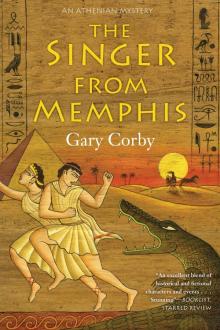 The Singer from Memphis
The Singer from Memphis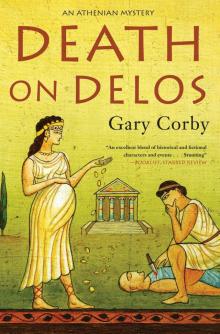 Death on Delos
Death on Delos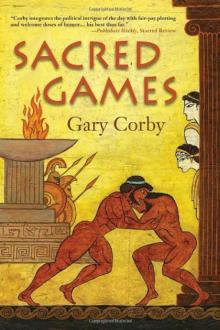 Sacred Games
Sacred Games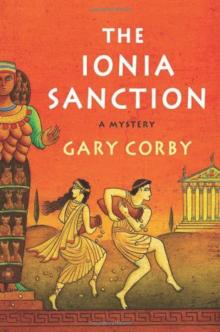 The Ionia Sanction
The Ionia Sanction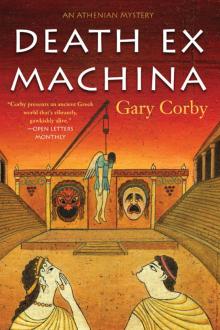 Death Ex Machina
Death Ex Machina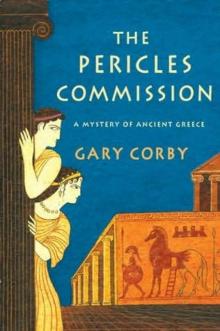 The Pericles Commission
The Pericles Commission